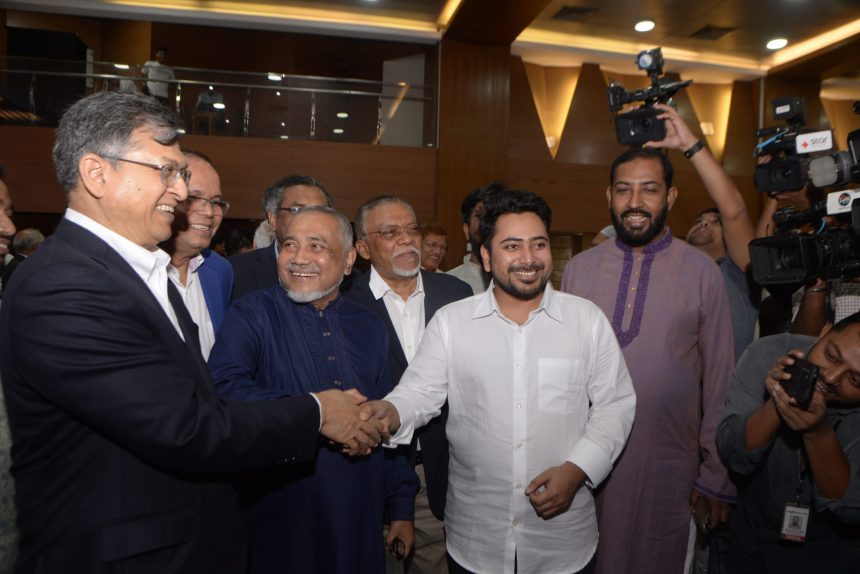Fearing a political comeback by the ousted Awami League, the Bangladesh Nationalist Party (BNP) and Jamaat-e-Islami are showing fresh interest in reducing their ongoing tensions.
Although concerns about internal rifts have existed for some time, recent news of the Awami League opening an office in India has pushed both parties to take the matter more seriously.
While there is no indication of a formal electoral alliance ahead of the next national polls expected in February 2026, senior leaders of both parties are making efforts to ease disputes and maintain a cordial tone in public.
They say they remain committed to unity against what they call “fascism.”
For more than 15 years, BNP and Jamaat jointly campaigned against the Awami League. Occasional frictions emerged, but these rarely affected their stance on national issues.
However, after the Awami League government was ousted on 5 August 2024 through a student – public uprising, disputes over several matters have strained relations between BNP and Jamaat.
The most visible rift emerged over the “July Declaration,” political reforms, and the election timeline.
Jamaat expressed dissatisfaction with the declaration read out by Chief Adviser Muhammad Yunus on the first anniversary of the July Uprising, claiming the move reflected the opinion of only one party.
Jamaat also criticised the decision to announce an election date without visible reforms, calling it a betrayal of the nation. They demanded elections be held under the legal framework of the July Charter after reforms were completed.
The BNP, however, welcomed the timeline of holding election in the first half of February next year and found the July Declaration appropriate.
It argued that the Charter could not be given legal legitimacy without a parliament and dismissed Jamaat and the National Citizen Party (NCP) demand for proportional representation in the upper house as unrealistic.
These differences had fuelled open verbal attacks. Jamaat leaders have branded the BNP as “extortionists,” while BNP figures have frequently referred to Jamaat as “the defeated forces of 1971.”
Yet, reports of the Awami League establishing an office in Kolkata have prompted renewed urgency for reconciliation. BNP and Jamaat leaders fear that prolonged infighting could create opportunities for the AL, Indian influence, or third-party intervention.
Behind the scenes, discussions are underway to bridge gaps, with BNP Standing Committee member Mirza Abbas and Jamaat’s Nayeb-e-Ameer Syed Abdullah Mohammad Taher taking part in the initiative.
Mirza Abbas told TIMES of Bangladesh, “We want unity with everyone who stood against fascism. On Jamaat’s issues, we have the same position. I’ve even spoken about this at a Jamaat programme.”
Taher echoed this, saying, “We have long been united. While leaders sometimes make harsh statements, we will remain on the same side against Awami League and fascism.
“We have been meeting each other’s top leaders regularly.”
Recent gestures of goodwill have included BNP delegations visiting Jamaat Ameer Shafiqur Rahman in hospital on multiple occasions, despite Jamaat not inviting the BNP to its rallies.
Earlier in April, Jamaat’s top leadership met BNP Chairperson Khaleda Zia at the London residence of BNP’s acting chairman Tarique Rahman.
Political analyst Professor Dilara Chowdhury, a former faculty member of Jahangirnagar University, said: “The BNP and Jamaat know that, given the chance, the Awami League and fascism will resurface.”
“Efforts to resolve internal disputes are therefore critical.”
Historically, the two parties have alternated between alliance and rivalry. After falling out with the BNP in 1996 over the caretaker government issue, Jamaat briefly aligned with the Awami League.
By 1999, it had rejoined the BNP to oppose the AL, leading to their joint victory in the 2001 election. The alliance lost to the Awami League in 2008 and later engaged in a united anti-government movement from 2013 to 2015.
Jamaat’s deregistered candidates contested under BNP’s symbol in the 2018 polls. Though the formal alliance was dissolved in 2022, both parties have continued to coordinate protests and programmes – most notably during the 2024 student-led quota reform movement.
Now, with political uncertainties ahead and the spectre of the Awami League’s return looming, BNP and Jamaat appear ready to set aside their disputes, at least for the time being.


